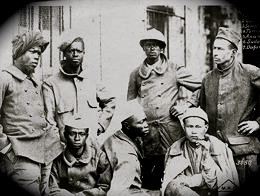
If the First World War is usually defined as the military clash of empires, it can also be reconceptualised as a turning point in the history of cultural encounters. Between 1914 and 1918, more than four million non-white men were drafted mostly as soldiers or labourers into the Allied armies: they served in different parts of the world – from Europe and Africa to Mesopotamia, the Middle East and China – resulting in an unprecedented range of cultural encounters.
The war was also a turning point in the history of photographic documentation as such moments and processes were recorded in hundreds of thousands of photographs by fellow soldiers, official photographers, amateurs, civilians and the press. In the absence of written records, these photographs are some of our most important – and hitherto largely neglected – sources of the lives of these men: in trenches, fields, billets, hospitals, towns, markets, POW camps. But how do we ‘read’ these photographs?
Using the First World War as a focal point, this interdisciplinary one-day workshop aims to examine the complex intersections between war, colonialism and photography. What is the use and influence of (colonial) photography on the practice of history? What is the relationship between its formal and historical aspects? How are the photographs themselves involved in the processes of cultural contact that they record and how do they negotiate structures of power?
This workshop aims to explore the multiple histories and intensities of meaning that cluster around war, colonialism and photography. Organised under the auspices of the HERA-funded research project Cultural Exchange in the Time of Global Conflict: Colonials, Neutrals and Belligerents during the First World War’, the conference seeks to bring scholars interested in the topic from different disciplines, including visual culture, sociology, geography, anthropology, colonial and military history, cultural and literary studies. We would like to invite papers on, but not limited to, the following themes:
- Photography and the spaces of war (esp. in Africa and the Middle East)
- Photographing ‘the other’
- Photography and imperial war propaganda (in belligerent and neutral countries)
- Science, anthropology and photography
- Soldiers as photographers and collectors
- Photography and the colonial archive
While the historical focus of the workshop is the First World War, we would also be interested in papers concerned with photographic representations of colonial violence in the late 19th and early 20th century as well as theoretical investigations of the subject. Proposals from scholars at any stage in their career are welcome.
Keynote & Discussant:
Prof Elizabeth Edwards; Director, Photographic History Research Centre, De Montfort University
Convenors:
Dr Santanu Das & Dr Daniel Steinbach, King’s College London
Participants should send abstracts of up to 300 words for a 20-25 minute paper, a short biography, and any enquiries to daniel.steinbach@kcl.ac.uk by 31 July 2015
Dr Daniel Steinbach
King’s College London
Virgina Woolf Building
22 Kingsway
London WC2B 6LE
Email: daniel.steinbach@kcl.ac.uk
La journée d’études s’inscrit dans le cadre du projet de recherches Cultural Exchange in Times of Global Conflict:Colonials, Neutrals and Belligerents during the First World War et aura lieu au King’s College à Londres le 17 September 2015.

Leave a Reply
You must be logged in to post a comment.